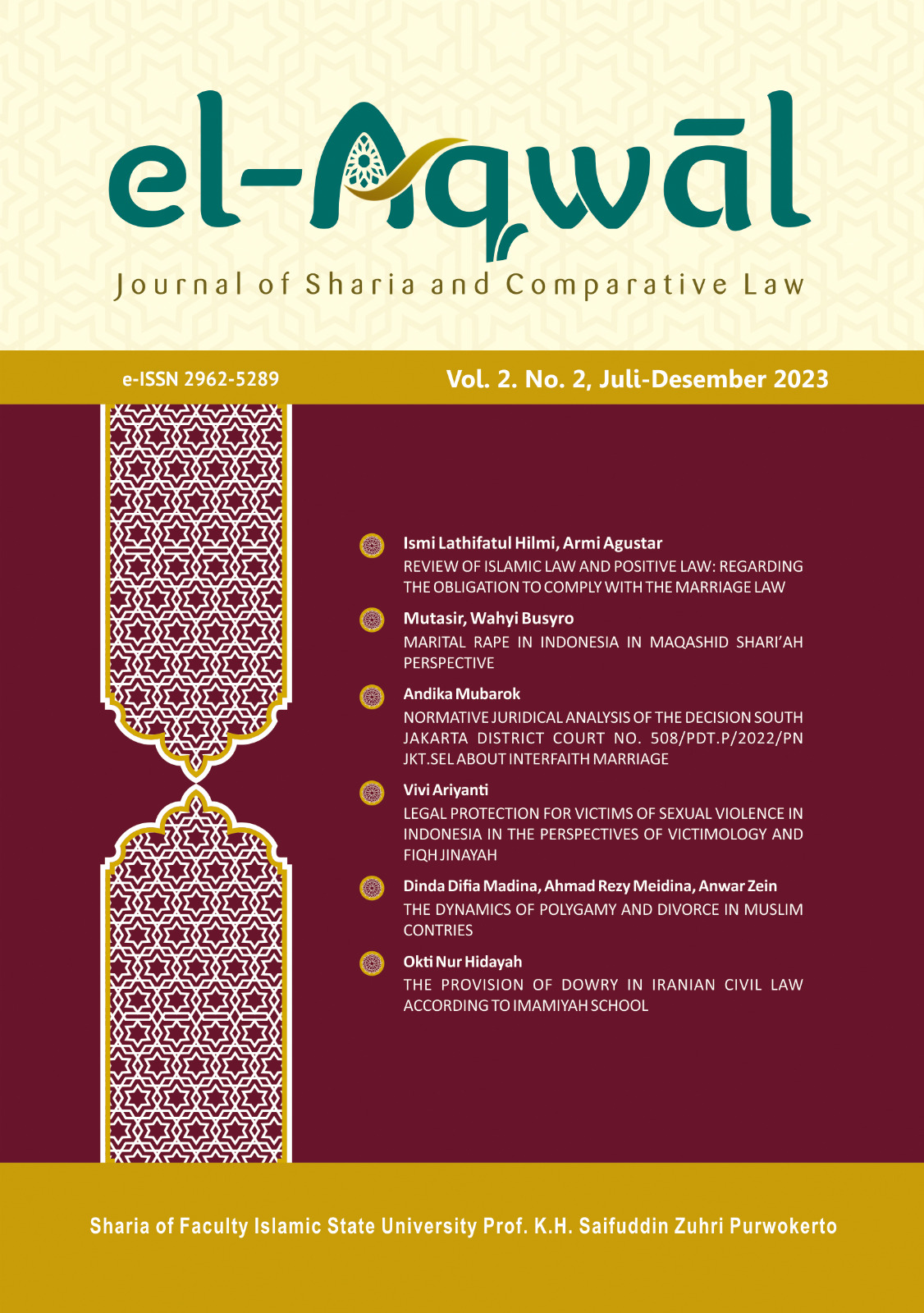The Provision of Dowry in Iranian Civil Law according to Imamiyah School
DOI:
https://doi.org/10.24090/el-aqwal.v2i2.9475Keywords:
Dowry, Iranian Civil Law, ImamiyahAbstract
In Iranian wedding tradition, the dowry (mahr) is not paid upfront as done in Arab culture, and there is no set deadline for its payment. The regulations regarding dowry in Iran are outlined in the Civil Code of the Islamic Republic of Iran, which states that anything that can be considered property, owned, and controlled can be designated as dowry. In the subsequent article, it is explained that dowry can be entirely or partially deferred. This article aims to elucidate the concept of deferred dowry (mahar dihutang) in Iranian civil law from the perspective of the Imamiyah School of Thought, which is the predominant school of thought in Iran. This study is conducted through a literature review with a normative approach. The research findings reveal that items eligible to be considered as dowry are those with an associated market value, in alignment with the principles of the Imamiyah school. Deferred dowry is permitted within the Imamiyah school, but when the husband is incapable of paying the dowry, the wife is allowed to make a decision to abstain from conjugal relations with him. This, however, cannot be used as a reason for divorce. In Iran, there exists a phenomenon known as "mahar prisoner" for husbands who fail to pay the dowry in full after marriage.Downloads
References
Abbasi, Hossein A., and Seyed M. Karimi. “Children’s Gender and Men’s Income: Evidence from Iran.” Review of Middle East Economics and Finance 13, no. 1 (2017). https://doi.org/10.1515/rmeef-2016-0028.
Abdurrahman. Kompilasi Hukum Islam Di Indonesia. Jakarta: CV Akademika Pressindo, 1992.
Akbari, Abu Al-Fazl, and Atusa Afsar. “The Social Analyses of Dowry in Iran with a Glance over Dowries in Qajar Er.” Scientific Quarterly of Social-Cultural Studies of Khorasan 6, no. 3 (2013): 7–26.
Ali, Ghasemi jahan, Sadrizadeh Seyed Farid, Hashemian Bojnord Nahid, and Hashemian Alaheh Alsadat. “Dowry Studies Review in Jurisprudence and IRAN Civil Law for Women Realistic Valuation.” In International And National Conference On Management, Accounting and Law Studies, 2020.
Anbari, Sabre Gul. “Mahar Wanita Iran.. Bayar Atau Penjara.” alaraby, 2022. https://www-alaraby-co-uk.translate.goog/society/مهور-الإيرانيات-الدفع-أو-السجن?_x_tr_sl=ar&_x_tr_tl=id&_x_tr_hl=id&_x_tr_pto=sc.
Daud, Fathonah K., and Aden Rosadi. “Dinamika Hukum Keluarga Islam Dan Isu Gender Di Iran: Antara Pemikiran Elit Sekuler Dan Ulama Islam.” Volksgeist: Jurnal Ilmu Hukum Dan Konstitusi 4, no. 2 (2021). https://doi.org/10.24090/volksgeist.v4i2.5738.
Fard, Mohammad Reza Komeili, Ehsan Ali Akbari Babukani, and Mohammad Ali Heidari. “Analysis of the Legal Jurisprudential Rulings on the Insolvency Payment of Dowry (With Emphasis on Judicial Procedure).” Qur̓ān va Ṭib (Quran and Medicine) 4, no. 5 (2020): 115–23.
Farzanegan, Mohammad Reza, and Hassan F. Gholipour. “Divorce and Gold Coins: A Case Study of Iran.” Munich, 2017.
Gunawan, Asep. Artikulasi Islam Kultural Dari Tahapan Moral Ke Periode Sejarah. Jakarta: PT. Raja Grafindo Perkasa, 2004.
Hashemi, Esmat, and Mohsen Esmaeili. “The Revival of Dowry Tradition.” Specialty Journal of Politics and Law 3, no. 3 (2018): 48–55.
Hossein, Jamalan, Rajaei Fatemeh, and Hokmabadi Aliakbar. “Examining the Conditions of Dowry and Its Payment Based on Current Rate in Iranian and Egyptian Laws.” Family Law And Jurisprudence (Nedaye Sadiq) 26, no. 75 (2022): 271–97. https://sid.ir/paper/957111/en.
ICRO. Iran the Cradle of Civilization. Jakarta: Kedutaan Besar Republik Islam Iran, 2009.
Islamic Republic of Iran. the Civil Code of the Islamic Republic of Iran, issued 1928.
J., Stewart Devin. Islamic Legal Orthodoxy: Twelver Shiite Responses to The Sunni Legal System. Salt Lake City: UT: University of Utah Press, 1998.
Jaffari, mohammad hosein, abuzar golshani, and mohammad hosein karimi. “Investigation of Dowry in the Iranian Legal System with Regard to Economic, Political and Social Interventions of the Government.” Political Sociology of Iran 5, no. 10 (2023): 3221–34. https://doi.org/10.30510/psi.2022.256472.1341.
Jamatia, Purna Laxmi. “Dowry System: An Impediment to Women Empowerment.” Journal of Media,Culture and Communication, no. 22 (2022): 8–13. https://doi.org/10.55529/jmcc22.8.13.
Marandi, Mohammad Reza, and Mojtaba Rahmani. “The Study of the Financial Effects of Divorce on Iran’ s Law.” Journal of Social Sciences and Humanities Research 5, no. 04 (2017): 1–4.
Mughniyah, Muhammad Jawad. Al-Fiqh ’ala Madzhab Al-Khamsah. Translated by Afif Muhammad. Jakarta: Basrie Press, 1994.
Pezeshki, Sara, Seyed alireza Hoseyni, and Mohammad Hossein Nazemi. “Women’s Individual Rights in the Iranian Society and Matching the Rights of Egypt.” Political Sociology of Iran 5, no. 10 (2022): 362–75. https://doi.org/10.30510/psi.2022.334411.3282.
Yuhermansyah, Edi, and Mohd Hakim Bin Mohd Akhir. “Implementasi Batas Umur Pernikahan (Studi Kasus Di Mahkamah Rendah Syari’ah Bukit Mertajam Pulau Pinang).” Samarah 2, no. 2 (2018): 485–501. https://doi.org/10.22373/sjhk.v2i2.4749.
Downloads
Published
How to Cite
Issue
Section
License
Copyright (c) 2023 Okti Nur Hidayah Hidayah

This work is licensed under a Creative Commons Attribution-ShareAlike 4.0 International License.
Authors who publish with this journal agree to the following terms: Authors retain copyright and grant the journal right of first publication with the work simultaneously licensed under a Creative Commons Attribution-ShareAlike 4.0 International License that allows others to share the work with an acknowledgment of the work's authorship and initial publication in this journal.











